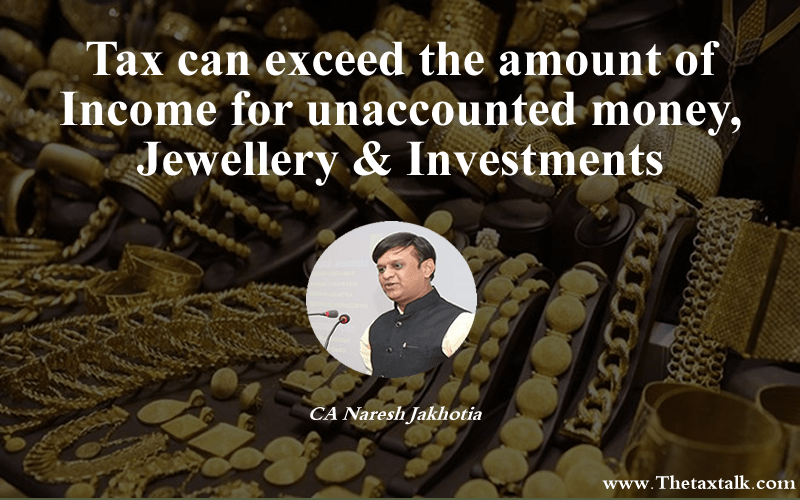![]()
Tax can exceed the amount of Income for unaccounted money, Jewellery & Investments
“The power to tax is the power to destroy.”- John Marshall
Those who think that 30% is too high need rate of taxation need to know that there are certain amount which could also be taxed @ 78% or 108% or @ 138%. It may sound unrealistic or unbelievable but there are the hard provisions incorporated in Income Tax Act- 1961 as a measure to tackle the menace of unaccounted money. The income which could be taxed such exceptionally higher rate of taxation of 78% or more are incomes covered by section 68, 69A, 69B, 69C & 69D of the Income Tax Act-1961. Let us know about all such incomes.
1. Section 68- Cash credit:
Unexplained cash credit (i.e., credit entry in the books of the taxpayer which cannot be explained or justified) will be taxable u/s 68. It includes accommodation entry taken by the taxpayer, share application money received by closely held company if it failed to prove the identity, creditworthiness & source of funds of shareholder. As a precautionary measure, before closing the books of accounts every year, taxpayer should check & recheck if there is any credit in the books of accounts which could be treated as unexplained cash credit to avoid the rigor of 78%.
2. Section 69- Unexplained Investment:
All investments which remained unrecorded in the books of the taxpayer are taxable u/s 69. It includes all unrecorded investment like investment in car, property, FDR etc. It may also include the unaccounted investment by way of construction over the property etc.
3. Section 69A- Unexplained Money, etc:
If taxpayer is found to be the owner of any unrecorded money, Bullion, Jewellery or other valuable articles then such amount would be taxable u/s 69A. It will include unrecorded jewellery/ ornaments/ money or even cash etc found in the possession of taxpayer in locker or elsewhere which is not accounted for.
4. Section 69B- Amount of Investment, etc not fully disclosed in books of account:
If taxpayer is found to be the owner of investment which is not fully or completely disclosed in the books then such amount would be taxable u/s 69B. It would include under-billed transaction, suppressed investment in factory/immoveable property, etc.
5. Section 69C- Unexplained Expenditure, etc:
If taxpayer has incurred any expenditure which is not fully or truly recorded in the books of the taxpayer, then it will be taxable u/s 69C. It would include unrecorded foreign tour expenses, unrecorded marriage/birthday party expenses etc.
6. Section 69D- Amount borrowed or repaid on Hundi:
Any transaction of borrowing or repayment thereof on Hundi in cash can be treated as income of the person borrowing or repaying it.
Taxability of Income referred to in section 68,69, 69A,69B,69C,69D:
All income of the nature referred above is taxable u/s 115BBE. It is liable to be taxed flat @ 60% whether it is voluntarily disclosed by the taxpayer while filing income tax return or assessed by the Income Tax Officer during the course of assessment. Such flat tax rate of 60% is further subject to surcharge of 25% & Health & Education cess of 4% (3% till AY 2018-19), making effective tax rate @ 78% (60%+15%+4%).
Further, if the amount of income is assessed by Income Tax Officer (& not disclosed by the taxpayer voluntarily while filing his return) then penalty @ 10% would also be leviable [Section 271AAC)].
A Stiffer penalty Provisions is there where such income is found during the course of search & seizure (i.e., Income Tax Raid). If such income is found during Income Tax Raid, then apart from the tax and surcharge as mentioned above, penalty @ 30% of income will be levied if taxpayer admits the tax evasion & pays the tax. In other cases (i.e., addition is not admitted during raid) the penalty would be @ 60% [u/s 271AAB]. With increase in the cess from 3% to 4% now, the final tax rate could go up to 138% (including all).
Further, taxpayer cannot avail the benefit of basic exemption limit benefit i.e., even if no other taxable income is there, basic exemption limit cannot be reduced from above income. No deduction in respect of any expenditure or allowance [or set off of any loss] shall be allowed to the assessee in computing his income referred to in clause (a) of sub-section (1) of Section 115BBE.
[Readers may forward their feedback & queries at nareshjakhotia@gmail.com. Other articles & response to queries are available at www.theTAXtalk.com]

